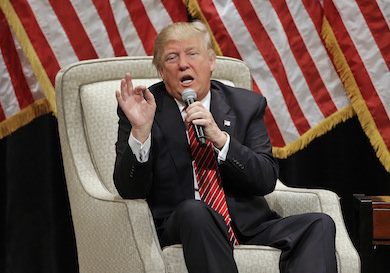No, Donald Trump Is Not the Most Important Voice in Our Politics
The evidence is in, and it shows that the dominant media narratives about 2016 are wrong. Donald Trump's popularity reveals the discontent among Americans caused by inequality. (Ivan Pierre Aguirre / AP)
Donald Trump's popularity reveals the discontent among Americans caused by inequality. (Ivan Pierre Aguirre / AP)
WASHINGTON — The evidence is in and it shows that the dominant media narratives about 2016 are wrong. Our country is not roiled with across-the-board discontent, and Donald Trump is not the most important voice in our politics. Turmoil in one of our political parties is being misread as reflecting a deep crisis well beyond its boundaries.
The most revealing and underplayed development of the week is Gallup’s finding that President Obama’s approval rating hit 53 percent (not once, but three times). This was its highest level since April 2013. If the people of the United States had lost all confidence in their institutions, the president wouldn’t be enjoying such a surge in popularity.
Compare the current incumbent, first, to George W. Bush. His approval rating at this point in his presidency was 32 percent, on its way down to 28 percent a few weeks later. And in a comparable period in 1988, Ronald Reagan’s approval stood at 50 percent. Note that the incumbent party was routed in 2008 but comfortably held on to the White House 20 years earlier.
And the demography of Obama’s support explains why a relentless media focus on Trump and the Republican primaries entirely warps the message coming from Americans as a whole. Obama’s approval is at 89 percent with Democrats and 50 percent among independents. But it stands at only 12 percent with Republicans and 9 percent among conservative Republicans. Yet the voices of conservative Republicans are being amplified beyond all reason by the obsession with Trump and the GOP’s struggles.
Sure, conservatives really don’t like Barack Obama. But that’s not news and we certainly didn’t need Trump to bring it to us.
And speaking of Trump, the sharp partisan differences in attitudes toward him again signal the folly of viewing this year’s political events through a lens trained almost entirely on one party. A March 16-21 Quinnipiac poll, for example, found that Trump was viewed favorably by 62 percent of Republicans but only 34 percent of independents and 6 percent of Democrats. His overall favorability rating: 33 percent.
In the case of Obama, many independents are on the same page as Democrats. In the case of Trump, affection is mostly a Republican phenomenon — and even there, Trump has far less sympathy in his party than Obama has among those in Democratic ranks. Trumpism is not sweeping the nation. It has a strong foothold only in the Republican Party, and not even all of it.
Now only Pollyanna or Candide would conclude that everything is going swimmingly for our country. The Trump rebellion in the GOP and the Bernie Sanders revolution among Democrats both reveal the discontent of Americans who have been left out in our return to prosperity. If there is a bipartisan message in 2016, it is that our ruling classes have ignored the plight of those being hammered by technological change and globalization.
But Trumpism is a very poor guide to what needs to be done. Those hurting include both middle-aged white working-class voters, particularly men, and African-Americans who — as the sociologist William J. Wilson showed in his pioneering book “When Work Disappears” — were particularly disadvantaged by deindustrialization. At a time when we need to address legitimate grievances across our lines of division, Trump is driving a racial and ethnic wedge through the country.
As Jason McDaniel and Sean McElwee pointed out in an important analysis of the data on the contest so far, “racial attitudes uniquely predict support for Trump,” including “racial resentment and explicit racial stereotypes.”
This doesn’t mean that we should write off the pain many Trump supporters feel. Nor should we ignore Trump’s challenge to conservative economic orthodoxy. But in the wall-to-wall coverage of Trump, the backlash around race and how he is courting it deserve far more scrutiny — even if this means The Donald might turn down a television network’s offer to do yet another telephone interview, in his pajamas if he wishes.
At the least, the media might start asking whether the president’s popularity and Trump’s relative lack of it tell us something very important about what is happening in our nation that is being utterly lost in the clamor of Trumpism. We are allowing a wildly and destructively inaccurate portrait of us as a people to dominate our imaginations and debase our thinking.
If you will forgive me for borrowing from the man obsessed with talking about “winners,” someone here is a “loser,” and it’s not Barack Obama.
E.J. Dionne’s email address is [email protected]. Twitter: @EJDionne.
Your support matters…Independent journalism is under threat and overshadowed by heavily funded mainstream media.
You can help level the playing field. Become a member.
Your tax-deductible contribution keeps us digging beneath the headlines to give you thought-provoking, investigative reporting and analysis that unearths what's really happening- without compromise.
Give today to support our courageous, independent journalists.






You need to be a supporter to comment.
There are currently no responses to this article.
Be the first to respond.